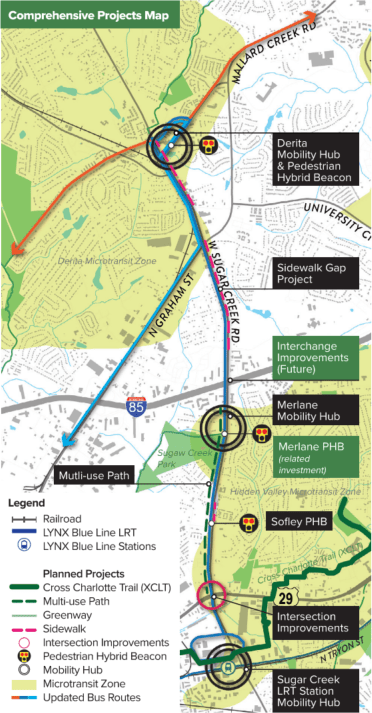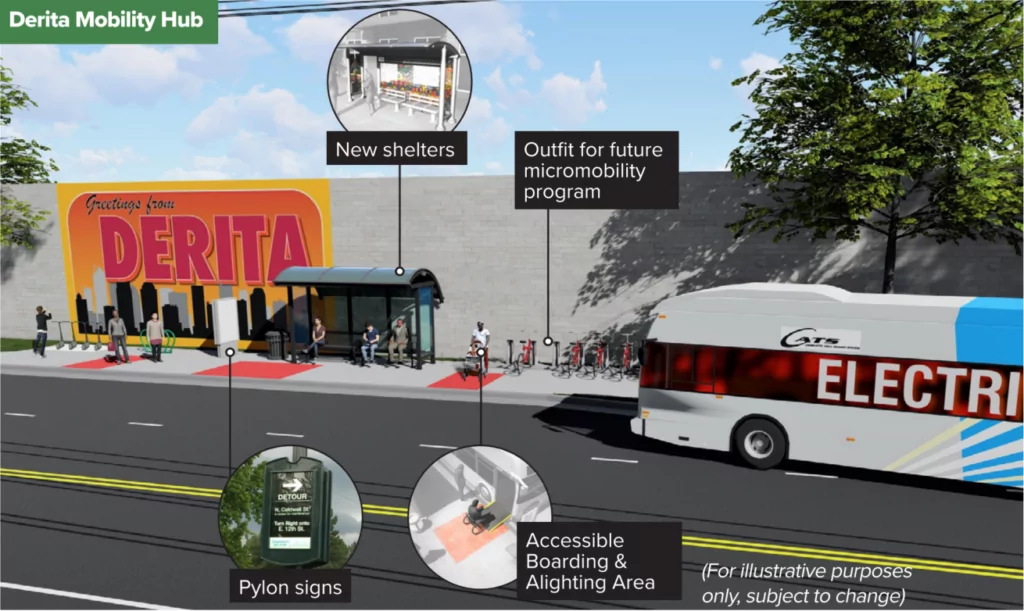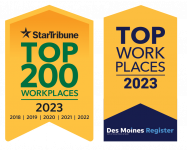West Sugar Creek Mobility Corridor: Connecting People to Opportunity
As a recipient of a 2023 RAISE Grant totaling $12 million, the City of Charlotte, North Carolina will create new and improved active transportation and mobility infrastructure on one of the city’s priority corridors – West Sugar Creek Road. This investment will enable the city and their partners to implement upgraded pedestrian crossings, smart lighting, enhanced sidewalk connections, and a new multi-use path, forming a safe pedestrian network between new mobility hubs, a light rail station, and two neighborhood centers. The grant will also assist in the creation of three technology-driven mobility hubs which connect residents to flexible transit options, high frequency bus routes, and the LYNX light rail. These enhancements will protect non-motorized travelers from traffic safety risks, reduce fatalities in the corridor, support local businesses, community assets, and public health, all while providing access to jobs and services.
West Sugar Creek: The Corridor of Opportunity
The West Sugar Creek Mobility Corridor has been designated by the City of Charlotte as a ‘Corridor of Opportunity.’ The corridor connects two neighborhoods, Derita and Hidden Valley, which are ethnically diverse, have strong community identities, and are historically significant to the City of Charlotte. Along the corridor are Areas of Persistent Poverty and census tracts categorized as Historically Disadvantaged Communities. The corridor is a critical piece of infrastructure as it connects the neighborhoods to commercial nodes, I-85 and NC-29 / North Tryon Street regional roadways, the LYNX Blue Line light rail, and the Cross Charlotte Trail.


Improving Safety Along West Sugar Creek Corridor
Between 2017 and 2022, there were 58 pedestrian and 10 bicycle crashes, including 31 fatal or serious injury crashes along the corridor. The proposed improvements will help to prevent and reduce these statistics. While safety and connectivity are two large factors of the project, its implementation will have positive effects on the environment, local businesses, and the quality of life of those who live around and travel through the corridor.
Serving Communities Through Partnerships
The project has been developed in partnership with residents, community-based organizations, and private-sector partners since the beginning to ensure underserved communities are meaningfully integrated. As the project continues, the city set goals to partner with minority and woman-owned businesses to assist in bringing the project to life. These corridor improvements will positively impact thousands of lives through how people live, work, and play.
Receiving the grant in June 2023 was a critical step in the project to create a safe and connected West Sugar Creek Corridor. The city partnered with Bolton & Menk to apply for funding through the USDOT’s RAISE program. Bolton & Menk’s Charlotte office assisted the city with developing mobility hub concepts, cost estimates, and the overall grant application. With local knowledge and the commitment to creating safer communities, Bolton & Menk is honored to have been able to assist the City of Charlotte in obtaining the RAISE grant, while continuing to move the West Sugar Creek Mobility Corridor towards implementation.
Learn more about our transportation services.
 Abby Williams is a transportation project engineer who began her career in 2017. Prior to joining Bolton & Menk she worked for public and private clients in the Carolinas. She is responsible for designing and planning transportation projects that keep our communities moving safely and sustainably. Abby is experienced in bicycle and pedestrian design, Complete Street design, roadway and greenway corridor design, and modeling and traffic analysis. Her passion for the field stems from her commitment to expanding active transportation offerings and minimizing environmental impacts to support public health and foster social equity.
Abby Williams is a transportation project engineer who began her career in 2017. Prior to joining Bolton & Menk she worked for public and private clients in the Carolinas. She is responsible for designing and planning transportation projects that keep our communities moving safely and sustainably. Abby is experienced in bicycle and pedestrian design, Complete Street design, roadway and greenway corridor design, and modeling and traffic analysis. Her passion for the field stems from her commitment to expanding active transportation offerings and minimizing environmental impacts to support public health and foster social equity.
 Zoe Huebner is a transportation planner at Bolton & Menk who started her career in 2023. Zoe’s responsibilities include project planning, design, grant writing and research. Her previous experience includes grant writing for the Rebuilding American Infrastructure with Sustainability and Equity (RAISE) and Safe Streets and Roads for All (SS4A) programs, comprehensive plan creation for communities within North Carolina, and assisting with community engagement events. Zoe is passionate about the field of planning because it gives her the opportunity to help people live healthier and safer lives through changing the environment.
Zoe Huebner is a transportation planner at Bolton & Menk who started her career in 2023. Zoe’s responsibilities include project planning, design, grant writing and research. Her previous experience includes grant writing for the Rebuilding American Infrastructure with Sustainability and Equity (RAISE) and Safe Streets and Roads for All (SS4A) programs, comprehensive plan creation for communities within North Carolina, and assisting with community engagement events. Zoe is passionate about the field of planning because it gives her the opportunity to help people live healthier and safer lives through changing the environment.
